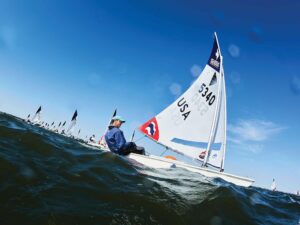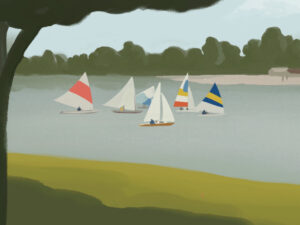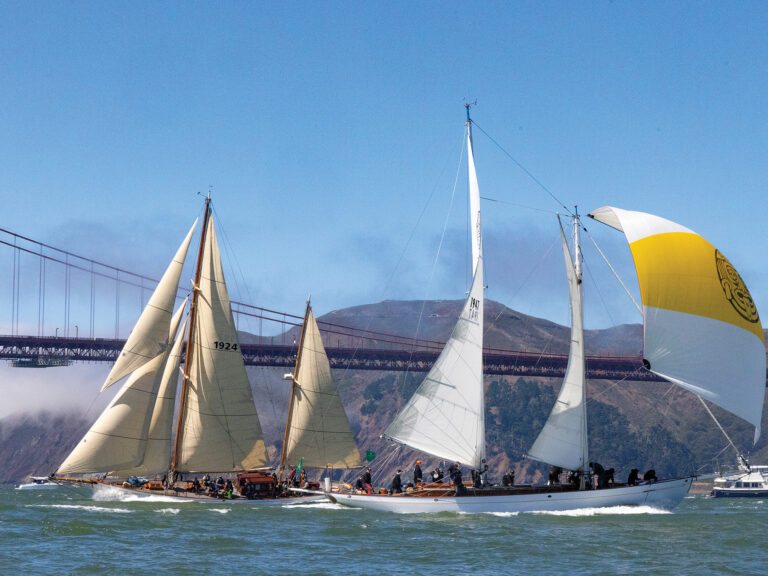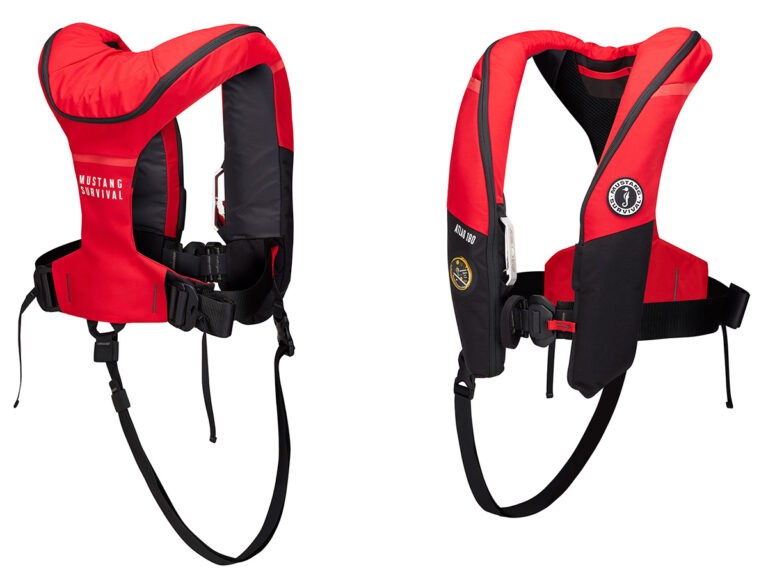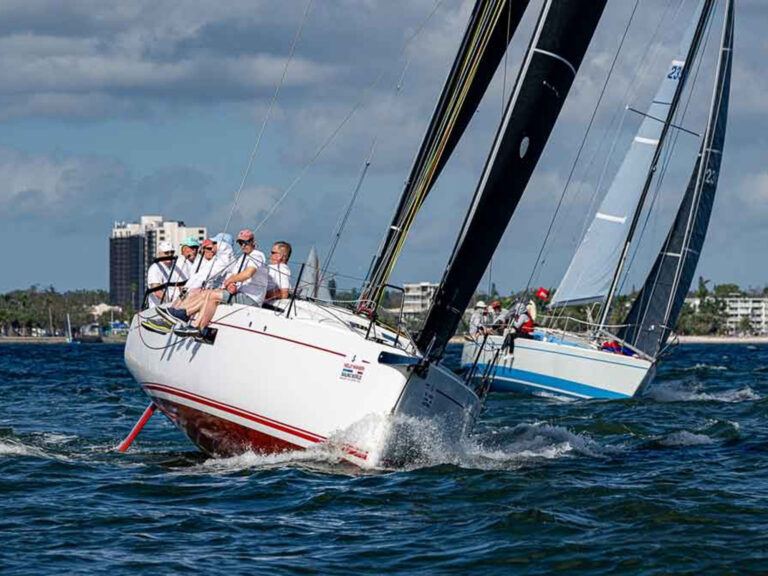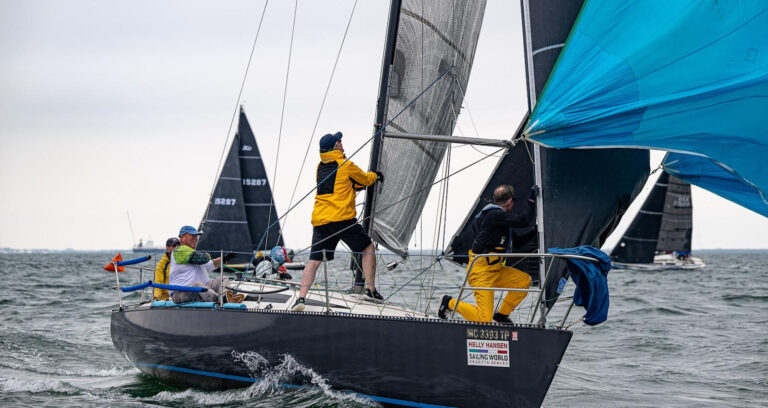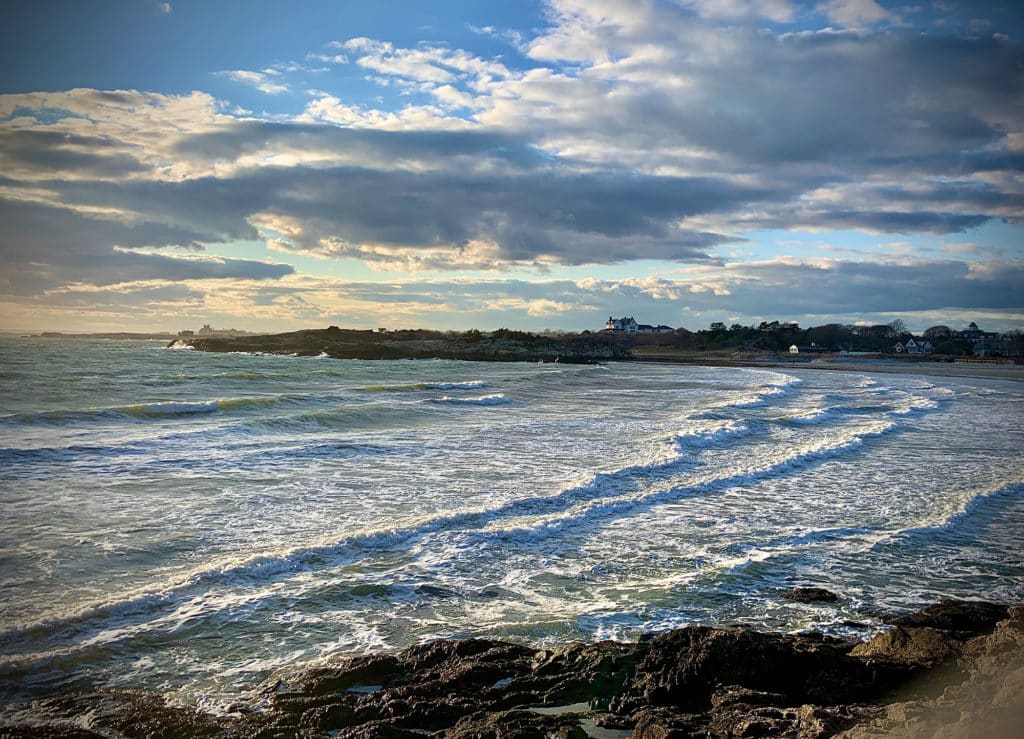
“Dave!”
I hear a holler from behind me, which snaps me out my blissful zone. One heartbeat sooner, I was groovin’ and weavin’ my Turnabout through steep chop, bow pointed toward Goat Island. I was zeroing in on a juicy wind line ahead of me, ready to take a bite out of it and extend my lead on a wide-open starboard layline. The fresh, clean air tasted so good.
When I hear my name, I swivel my head over my right shoulder and see FJ Ritt straight behind me. Another couple hundred feet directly behind him, I immediately spot the telltale white hull of a capsized Turnabout at the leeward mark.
“Nuts!” I utter aloud.
(And yes, I did say, “Nuts.” With three kids, I’ve curbed my cussing over the years).
Newport YC’s Frostbite Fleet rules are simple: Capsize equals cancel.
It’s cruel, especially for anyone winning a race, but the rules are the rules and plenty of others before have had their glory scuttled by capsize cancellation. I know. It happens, and it could’ve been me, but in this moment, my excitement whistles out of me like deflating balloon.
All week long, I’d been anticipating this day, keen to improve my boathandling woes and put up better results than I had on my first day in A Fleet. All week long, I fiendishly refreshed my weather app to believe a sunny, 43-degree day and a 10 to 15-knot southerly would come true. As I stood on the club’s south-facing porch before racing, admiring the vacant and sun-sparkled harbor, I said to fellow racer Nick Pasyanos: “This is perfection.” Finally, we have a day for maximum races and no capsizes to cut into the fun. “Yeah, it does not get better than this,” Pasyanos agrees.
The racecourse marks are pre-set for the morning’s 10-knot westerly wind direction, but with one final scan of the harbor as I zip my drysuit, a dark streak on the water fans out from the south. “There’s the sea breeze,” I say to Pasyanos, noticing a few white sails leaving the dock. “I better go. Boats are leaving, time to go play.”
I jog down to the dock where only three boats remain. I make a mental note to pay more attention to the morning exodus and not caught chatting in the club. With the new breeze direction, however, the race committee has to shift the marks, so I have time to get a feel for the conditions. Our racecourse is always set at the northern end of the harbor so the southerly fetch is long. The waves refract off docks and structures, creating a confused and bouncy seaway. As I sail upwind, water splashes over the foredeck and into the boat, so I shift weight back a few inches. Problem solved.
I find Ritt and try to pace him upwind. He’s quick, but I’m hanging with him before I turn downwind. Tubby as the Turnabout may be, I find I can get a little speed boost by S-turning in the waves. Years of Laser sailing makes this feel natural; up on the wave to catch the crest, smooth carve down with a little trim on the mainsheet to grab the apparent wind and a hint of a surf. I’m feeling fast and not the least bit intimidated in the building breeze. It’s a day for maximum races, indeed.
In my warm-ups, however, I do drop the tiller once during a tack, so I strip off my gloves right there and then and stuff them behind my PFD. It’s warm enough to get by without them. There will be no tiller dropping today. No way, Jose.
RELATED: https://www.sailingworld.com/story/racing/poor-young-dave/
When the course is finally reset, I check the line bias by hovering head-to-wind on a short starting line; the pin appears “favored” (closer to the first mark), so I’ll start there. Three minutes becomes two, then one, and I’m starting to feel anxious, like I’m late, but I scan quickly around me and see that everyone is scattered—this tends to happen in stronger winds as people get farther away from the line than they realize. The line is wide open, so I pull in my mainsheet and go for it. At 30 seconds, I’m having a hard time laying the pin, though. I’ve seen this movie before: it’s a big left shift and the winning move is an immediate tack to port.
I look to my right to see if I’ll have a clean exit. Ritt is a few boatlengths behind me. If I don’t cross him, I’m screwed. I’ll either hit him or foul him and look pretty stupid doing so. But this is where gut instincts take over. Sometimes, you just have to do it because it feels right.
I bear away for a few seconds to build speed and then sweep the tiller away and spin the boat through the wind. It’s not a good tack, but good enough, and as soon as I sit on the gunnel, I hear Ritt call, “Starboard.” He doesn’t yell it. He just states it, as matter of fact. He owns me right now. I duck under the boom to gauge how close we are crossing. Not a problem.
I’m free to roam, on the lifted tack with an open course that’s all mine, fresh air and all.
With my front foot hooked under the centerboard thwart, and my torso leaning out and aft, there’s no place I’d rather be. The sun is warm on my face and I’m entranced by the rhythm of the puffs and the waves, easing the sheet before gusts arrive, trimming back in and hiking harder as they pass. I keep a close eye on Ritt as we cross tacks a few times, keeping myself between him and the mark.
I’m first to the buoy and gingerly lean forward to pull the centerboard up a few inches, move my weight back and start carving the little waves. When I glance back I see Ritt bailing. That might be fast, I think, but there’s no way in hell I’m taking my attention away from steering. The little bit of water sloshing around in my bilge isn’t bothering me one bit.
A big gust arrives as I approach the next orange buoy. In the moment, I think back to the previous week, when I’d observed some of the old timers kneeling as they went into this same turn. Having learned from my slip, slide and tumble of the previous week, I’m not ashamed to take a knee and play it safe.
So, I do. With my right knee pressed to the dinghy’s floor, I lean forward and release the centerboard line from its cleat. The metal board clunks down into the trunk, and I ungracefully turn past the mark, in perfect control. Two legs down, two to go, and I’ve got my first A-Fleet win.
Now, you already know how this plays out. It’s not a “win” if there’s no finish. It’s an almost-win.
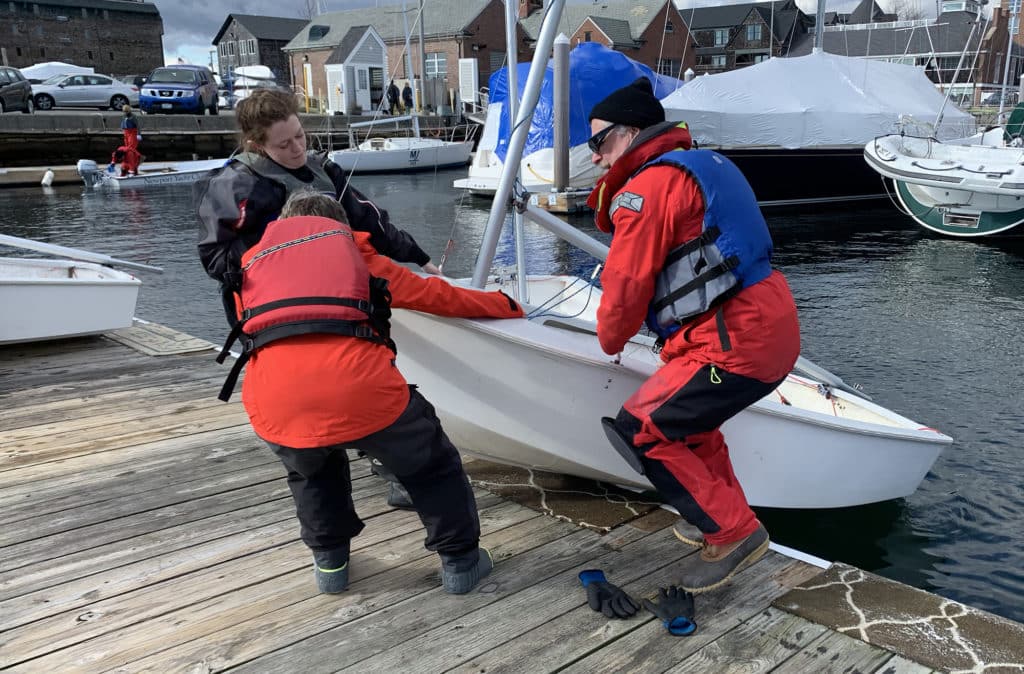
Everyone returns to the dock to tie up and wait while rescues are underway (in addition to one capsize, another skipper is sunk to the gunnels, but upright). Rather than stand around on the float, I sneak off to a protected corner of the basin and practice tacks and jibes. While doing so, I solve one problem I’ve been having with my mainsheet cleating during every tack. This happens because I tend to pull on the sheet while rolling the boat to weather mid-tack. Now, by holding the portion of the sheet in my hand up high in the early part of the tack, I reach in and grab the mainsheet between the boom block and the mainsheet block as I transition to the other side. I find it actually gives me a balance point as I step across the boat; like a granny bar. Plus, the mainsheet no longer cleats, so it’s free to be eased coming out the tack. It’s a little thing, but it’s a big improvement.
I eventually tie up with everyone else and head inside the club to raid the buffet while Ritt weighs the fate the afternoon. By 2 p.m., he makes the call to cancel, on account of the size of the chop, the strength of the puffs, and the age of the boats. I’m bummed, but the truth is, I have an ulterior motive behind sailing in this fleet. My parents live on the other side of town, and even though I live on the same small island, I don’t visit them enough. I’m trying to be a better son, to not be such a stranger.
So, instead of climbing the stairs to the yacht club bar, I climb into my car and call their landline. My mother is home. I’m on my way, I tell her, to stop by and say hello.
When I arrive, she’s dusting where the maid missed and watering the hundreds of plants scattered about rooms that once housed seven children. My father, as usual, is off tinkering with his beloved classic Dyer 40. My mother puts down her duster and we have lovely chat at the kitchen table; I bring her up to speed on my sailing, the kids, and whatever. She updates me on who she ran into the other day.
Outside her window, which looks southwest over the Atlantic, the sun is low and warm, the southerly blows through her white bedsheets on the clothes line. After an hour or so, she can probably tell by my fidgeting with my sunglasses that I belong outside, playing, as I always have. It’s a fine afternoon for a walk, so I bid farewell and beeline to Marine Avenue, a pocked dirt road that terminates on Newport’s stunning Cliff Walk. I’ve plotted my course well before I’ve even parked; I’ll walk south along the rocky shoreline, into the wind and the sun, so I can feel it on my face. I’ll reflect on the race that I didn’t win and what I’d learned. I’ll think deep and long about how fresh air, especially this ocean air, is so good for my soul.

